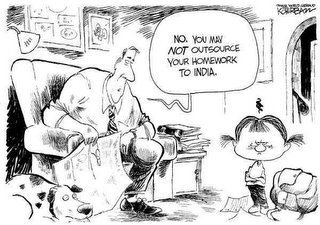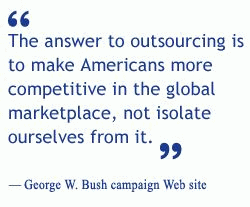We discussed in our previous post how India took the crucial decision of taking the plunge into the Globalization wave that was sweeping the planet and ride it rather than be washed away by it. We also concluded by saying that three factors are aiding India in attracting outsourcing service seekers to itself. Let us resume by seeing what these three factors are.
Knowledge, Infrastructure and Man Power
MNCs that poured into India to expand their global presence were captivated by the availability of highly skilled labour, abundant manpower and the necessary telecommunication infrastructure to run their offices from India at a fraction of the cost than from their natives, back in the developed countries.  That triggered off a rat race to use the resources that India had to offer and we are witnessing it getting even intense a decade and a half after India embraced globalization. Bangalore poised to emerge as the new Silicon Valley of the World, Chennai positioning itself as the Automobile capital of the East, creation of world class MNCs like Infosys, Wipro, TCS, Tata Steels, Baja, etc., all stand testimony to the emergence of India as a global player.
That triggered off a rat race to use the resources that India had to offer and we are witnessing it getting even intense a decade and a half after India embraced globalization. Bangalore poised to emerge as the new Silicon Valley of the World, Chennai positioning itself as the Automobile capital of the East, creation of world class MNCs like Infosys, Wipro, TCS, Tata Steels, Baja, etc., all stand testimony to the emergence of India as a global player.
 That triggered off a rat race to use the resources that India had to offer and we are witnessing it getting even intense a decade and a half after India embraced globalization. Bangalore poised to emerge as the new Silicon Valley of the World, Chennai positioning itself as the Automobile capital of the East, creation of world class MNCs like Infosys, Wipro, TCS, Tata Steels, Baja, etc., all stand testimony to the emergence of India as a global player.
That triggered off a rat race to use the resources that India had to offer and we are witnessing it getting even intense a decade and a half after India embraced globalization. Bangalore poised to emerge as the new Silicon Valley of the World, Chennai positioning itself as the Automobile capital of the East, creation of world class MNCs like Infosys, Wipro, TCS, Tata Steels, Baja, etc., all stand testimony to the emergence of India as a global player.Questions like "How long would the developed countries be able to feed us?" or "Would India be able to sustain its 8.1%GDP growth?" all appear too unworthy to even warrant an answer at this stage. However, a quick analysis would show us that when India ceases to offer the very advantages that were responsible in attracting the MNCs to it, we would cease to be the darling of the MNCs. They will start looking out for newer markets.
Looking at emerging world trends. the rise of new economic blocs in South East Asia, Eastern Europe, Southern Africa and Central South America, we may not even be given enough time to re-align and re-adjust. If tomorrow, say the South Asian economies start flexing their muscles and galvanize the MNCs to trigger off another mass migration, we may be end up facing an uncertain future that the developed countries like US, UK are facing today. Though I am sounding too pessimistic, we must not forget that we have some unique advantages like the huge man power availability, the massive English speaking population and most importantly a billion strong market within ourselves that MNCs will not give up for anything.. These will surely slow down the rate at which other countries can catch up with us. But catch up, they will, eventually.
What can help us tide over such a crisis when it eventually arises ?
I present a two point agenda that I feel would mitigate the effects of such an eventuality.
1. Outsource unto ourselves
Metros like Bangalore, Chennai and Hyderabad that are spear heading the outsourcing wave in India are confronted with dramatic increases in cost of living due too influx of youth from across the country. Salaries as a result are sky-rocketing. The 'cheap-labour' tag that these cities once had is being re-examined. What is the way out?
Indian MNCs are showing the way by branching out to second tier Indian towns and cities that still present the same advantages as these cities while keeping the cost of living low. A dual advantage here is evident. One, it provides the industry an opportunity to expand nationally and keep outsourcing still a viable option for the world industry's big boys. Two, India can help utilize this unending craving of the outsourcing industry for cheap labour, to create pockets of substantial growth across the country rather than have it concentrated at a few places. States can leverage on this to catapult themselves from being economically backward ones to being progressive states. Wealth creation can happen at a national level.
2. Moving up the Value chain
What applies to trade applies to the outsourcing industry too. When your competitor is catching up with you, you start offering your customers something in addition to the basic services. Something of value, something that pushes up your product or services demand in the market. Something that places you a notch apart from your competitor. I remember when my Dad established his own printing unit. We offered detailed proof correction at no additional cost in both English and the native language Kannada. This was something the other printing units could never fulfill unless they employed someone solely for that purpose.
Service providers in the outsourcing industry need to be constantly on the prowl to effectuate a steady movement up the value chain to not only negate advances of competitors but also expand business. More importantly, it helps undo the adverse effects of an early advantage not being an advantage any more. Let us suppose, China, which has started a massive English training program at the primary level for its population, starts narrowing the gap that currently is present between India and China in providing Information Technology Enabled Services (ITES). Ten years from now, India can survive a Chinese English speaking graduates onslaught, only if we are by then, providing something of value to the outsourcing service seekers, that China will find highly difficult to provide or at least require a few more decades to specialize in, by which time, we can move a rung further up on the value added services chain. An example would be our transition from just providing Business Process Outsourcing (BPO) services to start providing Knowledge Process Outsourcing (KPO) services.
I always go back to my 3 pots analogy to simplify my idea. Consider you have 3 interconnected pots. Two empty and the third brimming with water. Now if you place them at 3 differing levels with the water-filled one at the topmost level, water will flow from the first pot to the second. When the second fills up, the third which is still at a lower level fills up. However if the second pot on being filled up, is immediately replaced with another empty one, the third pot has to wait till the second one is full again. This, I am sure would need no explanation and answers the basic question that prompted these two posts.

As a final note, all the outsourcing we see is due to the world economics in action. Several factors, some listed by me, some not listed, some directly attributable, some indirectly playing their part, are all shaping the future. Wealth re-distribution is the only thing that is constant. Tomorrow, in the distant future when the Indian masses demand a luxury of the kind the developed world is enjoying today, wealth will start trickling to some other part of the globe. Unless, we introduce a second pot then, in other words, diversify and look beyond plain outsourcing as our revenue earner, we have to prepare ourselves for the not so rosy future that the developed nations are finding themselves face to face with.
Comments